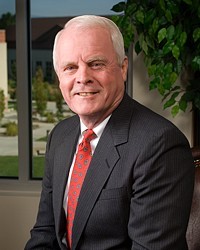A guy who is 55 does well to read a book titled A Resilient Life and subtitled “You Can Move Ahead No Matter What”, especially, when the blurb at the top of the front cover from the good, but perhaps overly gracious, folks at Publishers Weekly tells me that it is “a classic, riveting read…”.
The book is by Gordon MacDonald, the author of the widely read Ordering Your Private World which was greatly helpful to me when I read it over 25 years ago. But soon after reading that book, I learned that while MacDonald was helping me address the disorder of my private world, his had fallen apart through some very serious sin. I felt betrayed by one whom I had adopted as a mentor for my life.
After a necessarily lengthy absence from the public view, while he mended his own private world, MacDonald’s public writing began to show a great deal of mercy and grace and understanding for those who struggle and fail. Such a spirit is often absent in so much writing aimed at helping Christians live a distinctly Christian life. It was with great expectation then that I picked up a book written from MacDonald’s maturity and aimed at building resilience into life.
“Resilience” is a good, healthy word, one of a couple which will enter my vocabulary with refreshed meaning after having read this book. It speaks of the ability of a life to ‘spring back’ from set backs, to persist with life, to persevere after a goal. Resilience is a necessary component to a life well lived, and as I begin to ponder (another good word) what it means to finish life well, resilience has to be a part of the discussion.
The book, helpful to one like me who is, shall we say, closer to the end than to the beginning of life, is written in an almost Solomon-esque fashion. These are words of the wise written for the benefit of the young, and therein lies both the book’s greatest strength, and its sadly glaring danger.
The strengths are many and deep. MacDonald challenges us to build character and discipline into life which will enable us to persevere through adversity and to keep our eyes on goals greater than passing fancies. He encourages us to look to mentors, to find coaches, to develop relationships. He pushes us to nurture disciplines (though the disciplines of public worship and sacrament are noticeably downplayed if not absent altogether) and to fix our eyes on great things and worthy goals.
There is so much here that is so important for living life full of joy and ending life full of wisdom. There is so much here to adopt and to adapt for our own lives. And there is so much here that is deadly in the long run if it is divorced from the gospel. And that is my greatest concern.
Other than being better and finishing well, MacDonald gives us little motivation for abiding by his wisdom, and little or no comfort for those who fail or who are otherwise unable to live up to the standards set. One is left with the unspoken logic that when one fails, one’s failures have pushed the prospect of finishing well out of reach. It is a short trip from there to despair.
The motive for keeping the law (which anything like this is) is contained in Romans 12 and 1 John 4, and even Exodus 20. In view of God’s mercy, we offer ourselves (Romans 12). Grace comes first. We love because God first loved us (1 John 4). Grace comes first. God delivered us from bondage (Exodus 20). Grace comes first.
The gospel of God’s gracious love for us in Christ is what picks us up and encourages us to move forward. And this same gospel is what reassures us of our place and our importance and our hope when we fall down. Without a constant reminder of the gospel, law, wisdom, and challenges to discipline will all leave us either despondent or proud.
Discipline comes easy to some, and without the gospel, the disciplined person begins to take note of all that he has done, and his eyes fall off the cross and onto his stellar record book. And to those for whom discipline is a struggle, the challenge to try harder results in either rebellion or despair. And without the constant reminder of the gospel of grace all will tend to look to their performance for their happiness and security, a sad and troublesome place.
I’m not angry about the book’s lack. Just sad. I had hoped for more. This would be a wonderful book to pass on to a young Christian, but not without a deep understanding of grace. Lacking the gospel emphasis means that one reading it himself needs to be surrounded by the gospel and his heart needs to be well-seasoned by grace.
I’m really rather surprised by this lack. MacDonald is honest about his failures. He has no pride, because he understands grace so much better than I. But I finish reading the book less amazed by the grace of Jesus than I am by the grace of his wife. We could have had the latter without the absence of the former. I find that sad.
I will take away many very helpful things from this book. It would even be worth a second read. God has taught MacDonald much, and he conveys it well. I just won’t be giving the book out widely, no matter how ‘riveting’ Publishers Weekly found it to be.
